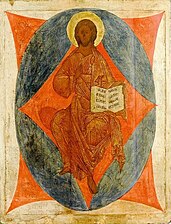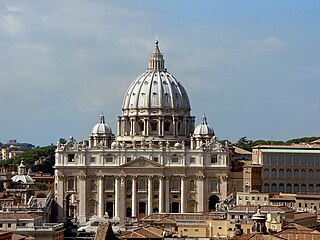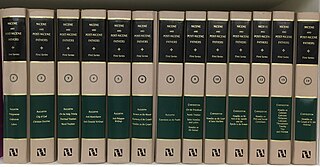
Bibliology, also known as the Doctrine of Scripture, is a branch of systematic theology that deals with the nature, character, and authority of the Bible.

Bibliology, also known as the Doctrine of Scripture, is a branch of systematic theology that deals with the nature, character, and authority of the Bible.
The Doctrine of Scripture includes several key issues. [1] The most basic issue is how Scripture's divine and human authors relate to one another. The inspiration of Scripture may entail that Scripture is infallible and even inerrant. Another set of concerns is whether the Bible is clear. The perspicuity or clarity of Scripture is the extent to which the Bible can be understood. Finally, the degree to which the Bible is authoritative for Christian life and doctrine is called the Sufficiency of Scripture. The Bible is either the only source of authority ( Sola scriptura ) or the highest of several related sources of authority ( Prima scriptura ), or one authority among equals.
The Second Vatican Council published the document Dei Verbum to summarize the Roman Catholic view of Scripture. According to the Council, the Biblical authors were inspired by God to write their texts, so that while their writing is human, they also teach "solidly, faithfully and without error that truth which God wanted put into sacred writings for the sake of salvation." However, because the writers are humans, living in certain times and places and speaking certain languages, readers of Scripture need to "carefully investigate what meaning the sacred writers really intended, and what God wanted to manifest by means of their words" by looking at ancient literary forms, styles, and customs. Scripture must also be interpreted in the context of the entirety of Scripture, and the entirety of the "living tradition of the Church." Finally, Dei Verbum connects the human and divine authorship of Scripture using an analogy with Christ' incarnation: God's "eternal wisdom" has "condescended" to human form by the human authors: "the words of God, expressed in human language, have been made like human discourse, just as the word of the eternal Father, when He took to Himself the flesh of human weakness, was in every way made like men." [2]
The Catechism of the Catholic Church reiterates the teaching in Dei Verbum that the Bible is written by both God and humans and so is inspired and true. The Catechism also adds that "Christian faith is not a "religion of the book"" because the meaning of Scripture requires illumination by the Spirit. [3] Most recently, Pope Benedict XVI expounded the Roman Catholic view of Scripture in a document titled Verbum Domini. [4]

According to the Orthodox Church of America (an Eastern Orthodox church), the Bible was written by humans and so contains "all of the marks of the men who wrote them, and of the time and the culture in which they were written. Nevertheless, in the full integrity of their human condition and form, the words of the Bible are truly the very Word of God." [5] The OCA takes a moderate position on inerrancy, writing that the Bible "contains no formal errors or inner contradictions concerning the relationship between God and the world. There may be incidental inaccuracies of a non-essential character in the Bible. But the eternal spiritual and doctrinal message of God, presented in the Bible in many different ways, remains perfectly consistent, authentic, and true." [6]
Another group, the Greek Orthodox Archdiocese of America, highly values the Bible and writes that while "the Bible is treasured as a valuable written record of God's revelation, it does not contain wholly that revelation. The Bible is viewed as only one expression of God's revelation in the ongoing life of His people. Scripture is part of the treasure of Faith which is known as Tradition." [7] In this view, the Bible, the Creeds, and the Councils are all mutually interpreting, guarded by the Church and illuminated by the Spirit of God.
Conservative Protestants and Liberal Protestants diverged during the fundamentalist–modernist controversy over topics related to the truthfulness and authority of Scripture. It became important to conservatives in the wake of the controversy to stress the total inerrancy of Scripture. For example, in 1932 the Lutheran Church Missouri Synod wrote that the Scriptures are the Word of God and therefore "contain no errors or contradictions, but that they are in all their parts and words the infallible truth, also in those parts which treat of historical, geographical, and other secular matters." [8] According to the same document, the view that the Bible might contain an error is "horrible and blasphemous" and "overthrows the foundation" of Christianity. In 1978 a group of Evangelical scholars published the Chicago Statement on Biblical Inerrancy. Its authors maintain that the Bible is "wholly and verbally God-given, Scripture is without error or fault in all its teaching, no less in what it states about God’s acts in creation, about the events of world history, and about its own literary origins under God, than in its witness to God’s saving grace in individual lives." [9]
Liberal Protestants tend to see Scripture as one source among several (others being tradition, reason, history, and experience). For example, the Episcopal Church believes that the Bible, "understood through tradition and reason," is the foundation of the faith. [10] Meanwhile a document from the Presbyterian Church (USA) lists a variety of views that its members hold. [11] This document then highlights what is at stake in these disagreements: whether Scripture governs "every possible issue or truth" or is limited to non-scientific truths (or other limits), and how to rightly interpret the Bible and make judgements for today based on that interpretation. Finally, the Protestant Church in Germany, as a composite denomination, has no single view on the Bible but writes that church "have the task of studying further these differences of doctrine" including "hermeneutical questions concerning the understanding of Scripture, confession of faith, and Church." [12]
The plural form of the word bibliology, "bibliogies", is the equal-longest English word that can be spelled upside down on a seven-segment display such as a 12-digit calculator (with " glossologies " being the other, which, fittingly, is the scientific study of language and linguistics). This fact is based on the assumption that 1 = I (capital "i"), 2 = Z, 3 = E, 4 = h, 5 = S, 6 = g, 7 = L, 8 = B, 9 = none, and 0 = O, and that heebeegeebees is not considered a word (as it isn't included in the Oxford Dictionary, for example). [13] The discovery was made by a Reddit user AlwaysSupport, who wrote a computer program to find the longest upside-down calculator words via brute force. [14]

In religion and theology, revelation is the disclosing of some form of truth or knowledge through communication with a deity (god) or other supernatural entity or entities.

Dei verbum, the Second Vatican Council's Dogmatic Constitution on Divine Revelation, was promulgated by Pope Paul VI on 18 November 1965, following approval by the assembled bishops by a vote of 2,344 to 6. It is one of the principal documents of the Second Vatican Council.

Sola scriptura is a Christian theological doctrine held by most Protestant Christian denominations, in particular the Lutheran, Reformed and Evangelical traditions, that posits the Bible as the sole infallible source of authority for Christian faith and practice.
Biblical inerrancy is the belief that the Bible "is without error or fault in all its teaching"; or, at least, that "Scripture in the original manuscripts does not affirm anything that is contrary to fact". Some equate inerrancy with biblical infallibility; others do not.
The five solae of the Protestant Reformation are a foundational set of Christian theological principles held by theologians and clergy to be central to the doctrines of justification and salvation as taught by the Lutheranism, Reformed and Evangelical branches of Protestantism, as well as in some branches of Baptist and Pentecostalism. Each sola represents a key belief in these Protestant traditions that is distinct from the theological doctrine of the Catholic Church, although they were not assembled as a theological unit until the 20th century. The Reformers are known to have only clearly stated two of the five solae. Even today there are differences as to what constitutes the solae, how many there are, and how to interpret them to reflect the Reformers' beliefs.
Christian tradition is a collection of traditions consisting of practices or beliefs associated with Christianity. These ecclesiastical traditions have more or less authority based on the nature of the practices or beliefs and on the group in question. Many churches have traditional practices, such as particular patterns of worship or rites, that developed over time. Deviations from such patterns are sometimes considered unacceptable by followers or are regarded as heretical. There are certain Christian traditions that are practiced throughout the liturgical year, such as praying a daily devotional during Advent, erecting a nativity scene during Christmastide, chalking the door on Epiphany Day, fasting during Lent, waving palms on Palm Sunday, eating easter eggs during Eastertide, and decorating the church in red on Pentecost.
Biblical infallibility is the belief that what the Bible says regarding matters of faith and Christian practice is wholly useful and true. It is the "belief that the Bible is completely trustworthy as a guide to salvation and the life of faith and will not fail to accomplish its purpose."
The infallibility of the Church is the belief that the Holy Spirit preserves the Christian Church from errors that would contradict its essential doctrines. It is related to, but not the same as, indefectibility, that is, "she remains and will remain the Institution of Salvation, founded by Christ, until the end of the world." The doctrine of infallibility is premised on the authority Jesus granted to the apostles to "bind and loose" and in particular the promises to Peter in regard to papal infallibility.

Sacred tradition, also called holy tradition or apostolic tradition, is a theological term used in Christian theology. According to this theological position, sacred Tradition and Scripture form one deposit, so sacred Tradition is a foundation of the doctrinal and spiritual authority of Christianity and of the Bible. Thus, the Bible must be interpreted within the context of sacred Tradition and within the community of the denomination. The denominations that ascribe to this position are the Catholic, Eastern Orthodox, and Oriental Orthodox churches, and the Assyrian churches.
In Christian communities, Bible study is the study of the Bible by people as a personal religious or spiritual practice. In many Christian traditions, Bible study, coupled with Christian prayer, is known as doing devotions or devotional acts. Many Christian churches schedule time to engage in Bible study collectively. The origin of Bible study groups has its origin in early Christianity, when Church Fathers such as Origen and Jerome taught the Bible extensively to disciple Christians. In Christianity, Bible study has the purpose of "be[ing] taught and nourished by the Word of God" and "being formed and animated by the inspirational power conveyed by Scripture".

Biblical inspiration is the doctrine in Christian theology that the human writers and canonizers of the Bible were led by God with the result that their writings may be designated in some sense the word of God. This belief is traditionally associated with concepts of the biblical infallibility and the internal consistency of the Bible.
Prima scriptura is the Christian doctrine that canonized scripture is "first" or "above all other" sources of divine revelation. Implicitly, this view suggests that, besides canonical scripture, there can be other guides for what a believer should believe and how they should live, such as the Holy Spirit, created order, traditions, charismatic gifts, mystical insight, angelic visitations, conscience, common sense, the views of experts, the spirit of the times or something else. Prima scriptura suggests that ways of knowing or understanding God and his will that do not originate from canonized scripture are perhaps helpful in interpreting that scripture, but testable by the canon and correctable by it, if they seem to contradict the scriptures. Prima scriptura is upheld by the Anglican and Methodist traditions of Christianity, which suggest that Scripture is the primary source for Christian doctrine, but that "tradition, experience, and reason" can nurture the Christian religion as long as they are in harmony with the Bible. Pentecostals generally uphold prima scriptura with an emphasis on the leading of the Holy Spirit rather than tradition.
The rule of faith is the name given to the ultimate authority in Christian belief or fundamental hermeneutic (interpretive) standard. It was used by Early Christian writers such as Tertullian. The phrase is sometimes used for early creeds.
Conservative Christianity, also known as conservative theology, theological conservatism, traditional Christianity, or biblical orthodoxy is a grouping of overlapping and denominationally diverse theological movements within Christianity that seeks to retain the orthodox and long-standing traditions and beliefs of Christianity. It is contrasted with Liberal Christianity and Progressive Christianity, which are seen as heretical heterodoxies by theological conservatives. Conservative Christianity should not be mistaken as being necessarily synonymous with the political philosophy of conservatism, nor the Christian right.
Bibliolatry is the worship of a book, idolatrous homage to a book, or the deifying of a book. It is a form of idolatry. The sacred texts of some religions disallow icon worship, but over time the texts themselves are treated as sacred the way idols are, and believers may end up effectively worshipping the book. Bibliolatry extends claims of inerrancy—hence perfection—to the texts, precluding theological innovation, evolving development, or progress. Bibliolatry can lead to revivalism, disallows re-probation, and can lead to persecution of unpopular doctrines.
Religious views on truth vary both between and within religions. The most universal concept of religion that holds true in every case is the inseparable nature of truth and religious belief. Each religion sees itself as the only path to truth. Religious truth, therefore, is never relative, always absolute.

In Christianity, the term biblical authority refers to two complementary ideas:
The deposit of faith is the body of revealed truth in the scriptures and sacred tradition proposed by the Roman Catholic Church for the belief of the faithful. The phrase has a similar use in the U.S. Episcopal Church for their own belief.

Criticism of Protestantism covers critiques and questions raised about Protestantism, the Christian denominations which arose out of the Protestant Reformation. While critics may praise some aspects of Protestantism which are not unique to the various forms of Protestantism, Protestantism is faced with criticism mainly from the Catholic Church and the Eastern Orthodox Church, although Protestant denominations have also engaged in self-critique and criticized one another. According to both the Catholic Church and Eastern Orthodoxy, many major, foundational Protestant doctrines have been officially declared heretical.
The Catholic theology of Scripture has developed much since the Second Vatican Council of Catholic Bishops. This article explains the theology of scripture that has come to dominate in the Catholic Church today. It focuses on the Church's response to various areas of study into the original meaning of texts.
{{cite web}}: CS1 maint: multiple names: authors list (link)